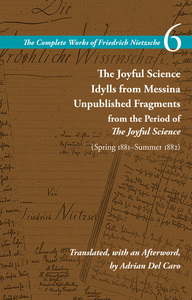![Cover of Taking Ourselves Seriously and Getting It Right [DECKLE EDGE] by Harry G. Frankfurt](/img/covers/med_large/pid_9376.jpg)
2006
136 pages.
$20.00
Paperback ISBN: 9780804752985
Ebook ISBN: 9780804768009
Harry G. Frankfurt begins his inquiry by asking, "What is it about human beings that makes it possible for us to take ourselves seriously?" Based on The Tanner Lectures in Moral Philosophy, Taking Ourselves Seriously and Getting It Right delves into this provocative and original question.
The author maintains that taking ourselves seriously presupposes an inward-directed, reflexive oversight that enables us to focus our attention directly upon ourselves, and "[it] means that we are not prepared to accept ourselves just as we come. We want our thoughts, our feelings, our choices, and our behavior to make sense. We are not satisfied to think that our ideas are formed haphazardly, or that our actions are driven by transient and opaque impulses or by mindless decisions. We need to direct ourselves—or at any rate to believe that we are directing ourselves—in thoughtful conformity to stable and appropriate norms. We want to get things right."
The essays delineate two features that have a critical role to play in this: our rationality, and our ability to love. Frankfurt incisively explores the roles of reason and of love in our active lives, and considers the relation between these two motivating forces of our actions. The argument is that the authority of practical reason is less fundamental than the authority of love. Love, as the author defines it, is a volitional matter, that is, it consists in what we are actually committed to caring about. Frankfurt adds that "The object of love can be almost anything—a life, a quality of experience, a person, a group, a moral ideal, a nonmoral ideal, a tradition, whatever." However, these objects and ideals are difficult to comprehend and often in conflict with each other. Moral principles play an important supporting role in this process as they help us develop and elucidate a vision that inspires our love.
The first section of the book consists of the two lectures, which are entitled "Taking Ourselves Seriously" and "Getting It Right." The second section consists of comments in response by Christine M. Korsgaard, Michael E. Bratman, and Meir Dan-Cohen. The book includes a preface by Debra Satz.
About the author
Harry G. Frankfurt is Professor Emeritus of Philosophy at Princeton University. He is author of the best-selling book, On Bullshit (2005). His other publications include The Reasons of Love (2004) and Necessity, Volition, and Love (1999).
"Frankfurt's argument is intelligent, sophisticated, and thooughtful."
—CHOICE
"In his Tanner lectures, Harry Frankfurt continues his exploration of the nature of human agency and practical reasoning. Love, and other 'volitional necessities'—things about which we cannot help caring—anchor us in the world and provide us with ends for our actions. Without love, or other kinds of volitionally necessary caring, we would not have an answer to the fundamental question of how we should live. This is a very important essay, written by a first-class philosophical mind, and animated by a humane outlook. It will be of interest not only to philosophers, but also to all those who look to understand the springs of human action."
—Debra Satz, Stanford University
"Frankfurt delves into the ideals of rationality and love, compares the two, and declares love the winner in defining self-commitment to our actions (which is "getting it right"). These arguments are related in superbly written prose and stand well on their own...The commentary, likewise, is well written and presents the reader with an enhanced framework and relevant, thought-provoking objections. "
—Library Journal
"This wise and engaging little book deals with issues that are profoundly important to us as human beings. Frankfurt effortlessly weaves together his thoughts on love, agency, and practical reason...Scholars interested in Frankfurt, or the philosophical issues discussed in his lectures, will enjoy readin this book."
—Philosophy in Review/Comptes Rendus Philosophiques

Unpublished Fragments from the Period of Thus Spoke Zarathustra (Spring 1884–Winter 1884/85)

Unpublished Fragments from the Period of Dawn (Winter 1879/80–Spring 1881)

The Joyful Science / Idylls from Messina / Unpublished Fragments from the Period of The Joyful Science (Spring 1881–Summer 1882)

The Novel and the New Ethics